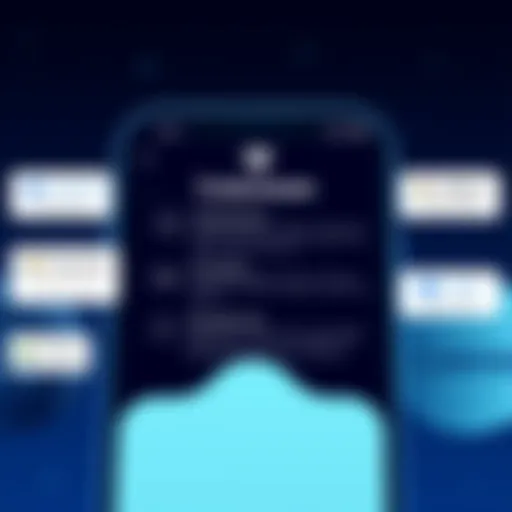Wix Appointment Reminder: Boosting Engagement & Efficiency


Intro
In the bustling world of business, maintaining a direct line of communication with clients is crucial. Enter the Wix Appointment Reminder—a feature designed not just for automating reminders but for enhancing overall client engagement and smarter time management. By harnessing this tool, businesses can significantly reduce the number of no-shows while simultaneously elevating the user experience. In this section, we will unravel its core functionalities, explore what sets it apart in the marketplace, and establish how one can set this feature into motion seamlessly.
The real power of this tool lies in its ability to cater to a diverse clientele, from small start-ups to larger enterprises. With the rise of remote work and digital interactions, integrating an efficient system for plan management is no longer a luxury but a necessity. Through this article, we'll unfold the threads of its setup processes, customization opportunities, and practical implementation tactics that will foster deeper connections with clients while encouraging repeat business.
Software Overview
The Wix Appointment Reminder stands out with several noteworthy features. Let’s take a deep dive into what makes it effective for both clients and service providers.
Software Features
- Automated Reminders: One of the standout features is the automated reminders that can be customized to meet the needs of different clients. These can be sent via email or SMS, ensuring that your clients have a gentle nudge about their appointments.
- Scheduling Flexibility: The platform allows businesses to modify their available time slots easily. This can be particularly useful in service-oriented industries where client schedules may frequently change.
- Customization Options: The reminder messages can be tailored to suit your brand’s voice or the specific service being offered. Adding personal touches can make clients feel valued and ensure that they remember their appointments.
- Analytics Tracking: This feature enables businesses to keep tabs on no-show rates and appointment frequency, providing invaluable insights that help refine scheduling strategies in real-time.
Technical Specifications
While the Wix Appointment Reminder is user-friendly, understanding its technical specs can deepen one’s confidence in utilizing the feature.
- Compatibility: It integrates seamlessly with various other Wix tools and third-party applications, making it versatile for users who may already be invested in the Wix ecosystem.
- User Capacity: Whether you're managing a handful of appointments a week or thousands daily, this tool scales with your business, accommodating increased demand without losing efficiency.
- Mobile Access: The platform is accessible on mobile devices, allowing both clients and business owners to manage schedules on-the-go, which aligns perfectly with today’s fast-paced lifestyles.
Peer Insights
Understanding how others perceive and interact with the Wix Appointment Reminder can provide valuable perspectives. Let’s examine some user experiences and weigh the pros and cons.
User Experiences
Many users report that the integration of appointment reminders has transformed their client engagement. Here are a few insights:
- Improved Client Communication: Users note that receiving automated reminders fosters better relationships; clients appreciate the attentiveness and professionalism.
- Reduction in No-Shows: Business owners specifically point to a marked decrease in no-shows after implementing this feature, translating to more efficient scheduling and better use of resources.
Pros and Cons
Every tool has its strengths and weaknesses. Here’s a rundown of the notable advantages and disadvantages of the Wix Appointment Reminder:
Pros:
- Enhanced client communication
- Reduction in scheduling conflicts
- High degree of customization
- Strong integration with Wix’s ecosystem
Cons:
- May require a learning curve for new users
- Dependent on internet connectivity for optimal use
Understanding these nuances is crucial as it helps stakeholders gauge the true value of incorporating the Wix Appointment Reminder into their operations.
In summation, the Wix Appointment Reminder isn't just a digital notification system; it's a comprehensive tool aimed at enhancing business-client interaction and optimizing time management. Through our further discussions, we will provide deeper insights into the setup process, potential customization avenues, and best practices for maximizing its effectiveness.
Understanding Wix Appointment Reminder
In the world of small and large businesses alike, time is indeed money. Efficient time management is paramount, and that’s where tools like the Wix Appointment Reminder come into play. Understanding this feature is not just about grasping the technicalities; it is about recognizing how it can fundamentally transform client communication and overall scheduling management. With automated reminders, businesses can enhance engagement and cut down on the pesky issue of no-shows, which has been a thorn in the side of many service providers.
Overview of Wix Scheduler
The Wix Scheduler serves as the backbone of the appointment reminder feature. This tool provides a centralized platform for businesses to manage their appointments seamlessly. The user-friendly interface means that even those not particularly tech-savvy can navigate it without getting lost in the weeds.
Features such as drag-and-drop scheduling, customizable appointment types, and easy client management make the scheduler a must-have. Users can set their availability, allowing clients to book services during predetermined time slots. One of the cooler aspects of this tool is its ability to sync with Google Calendar, which means you won't double-book or lose track of appointments across different platforms.
Implementing this tool can significantly increase efficiency, as it minimizes the back-and-forth communication often needed to finalize appointment times.
Importance of Client Reminders
Client reminders are crucial for maintaining an organized schedule. A simple text or email reminding customers of their upcoming appointments can go a long way. Here’s why they matter:
- Reducing No-Shows: The primary goal of appointment reminders is to decrease the number of clients failing to show up. This can lead to substantial financial losses, especially for service-based industries where time slots are finite.
- Enhancing Client Relations: Sending reminders is a gesture that shows respect for the client’s time. It displays a level of professionalism that often leads to better client relationships, fostering loyalty and repeat business.
- Improving Time Management: Notifications also help service providers better manage their day. When clients arrive as scheduled, it helps keep the workflow streamlined and efficient.
"Automating reminders not only saves time but nurtures client trust, ultimately enhancing the customer experience."


Overall, understanding the Wix Appointment Reminder and its underlying features will allow businesses to utilize it to its fullest potential. This not only optimizes appointment scheduling but also enhances the experience for clients, positioning businesses for long-term success in a competitive landscape.
Benefits of Using Appointment Reminders
In an era where time is of the essence, businesses cannot afford to overlook the myriad benefits that come with using appointment reminders. These reminders serve not just as a simple nudge for clients, but as a powerful tool that cultivates better engagement and optimizes time management for all involved. The significance of leveraging appointment reminders for businesses is profound, influencing operational efficiency, customer rapport, and, ultimately, the bottom line.
Reducing No-Shows
One of the primary advantages of appointment reminders lies in their capacity to drastically cut down on no-shows. When clients receive a reminder, they'll have a prompt to reflect on their commitments. It’s a bit like placing a friendly tap on their shoulder, saying, "Hey, your appointment is around the corner!" This practice not only minimizes the frustration tied to empty slots but also contributes positively to a business’s revenue forecast.
One study suggested that automated reminders can reduce no-show rates by nearly 30%. This means more clients actually showing up, which translates into increased appointment capacity and revenue.
Enhancing Client Communication
Effective communication stands as the cornerstone of any successful business relationship, and appointment reminders play a pivotal role in this exchange. Rather than waiting for a client to reach out to confirm or reschedule, proactive reminders demonstrate care for the client’s time and needs.
A well-timed reminder allows businesses to reinforce their message while providing critical details such as appointment timing and location. It’s a chance to clarify what clients can expect, which fosters a sense of professionalism. By consistently engaging clients, companies create a rapport that goes beyond one-time interactions.
"Good business is about good relationships; appointment reminders facilitate those connections."
Streamlining Business Operations
While client engagement is essential, the operational advantages of appointment reminders cannot be understated. These reminders assist in managing workflow and allow businesses to allocate resources more effectively. When no-shows decrease, service providers can optimize their schedules and better utilize employee time.
This streamlined operation becomes evident in scenarios where clients either run late or reschedule. Reminders allow businesses to fill slots more efficiently, reducing downtime and increasing staff productivity. Automation, in this instance, enters as a game-changer—freeing up time that employees would spend chasing down confirmations or managing no-shows.
In summary, the benefits of using appointment reminders extend beyond just decreasing non-attendance rates. They enhance communication between businesses and clients while smoothing operational processes, culminating in a more effective service model that satisfies both parties. Whether one runs a bustling salon or a small consulting firm, integrating appointment reminders into the business model could very well be the key to unlocking better client relationships and time management.
Setting Up Wix Appointment Reminders
Setting up reminders for clients isn’t just good practice; it’s essential in the busy worlds of little and big businesses. By effectively implementing Wix Appointment Reminders, you’re not only alleviating the stress of last-minute cancellations but also signaling to your clients that their time is valued. Let’s break this down into digestible steps to maximize your engagement with clients and manage your time with finesse.
Creating a Wix Account
Before you can dive into the world of appointment reminders, you’ll need to create a Wix account if you haven’t already. It’s the key to unlock a suite of powerful tools aimed at optimizing your business.
- Head over to wix.com.
- Click on "Get Started". You’ll be prompted to enter your email and set a password.
- Alternatively, you can sign up using a Google or Facebook account.
- After entering the required information, you’ll receive a confirmation email. Click on that link to verify your account.
This is your gateway into a plethora of customizable options! By establishing an account, you’ll have access not just to the appointment reminder features but also to website building tools that can take your business presence to the next level.
Navigating to the Wix Bookings App
Now that you’ve got your account set up, it’s time to introduce you to the Wix Bookings App. This app serves as your command center for managing appointments effortlessly.
- From the Wix Dashboard, find the "Apps" menu on the left.
- Click on "Visit Wix App Market".
- In the search bar, type in "Wix Bookings" and select it from the results.
- Click on "Add to Site". This action seamlessly integrates the booking feature into your existing site.
The Wix Bookings App is designed for ease of use, ensuring you can navigate through it even if tech isn't your forte. With this app, right at your fingertips, managing your schedule becomes less cumbersome.
Configuring Appointment Settings
After you’ve got your bookings app activated, the next logical step is to configure your appointment settings. This is where you can mold the reminders to fit your business personality and client needs.
- Navigate to the "Bookings" section within the app.
- Set your availability hours for appointments. This ensures that clients only book when you're free, preventing overlaps and unnecessary back-and-forth.
- Customize reminder notifications. Options typically include sending reminders via email or SMS and specifying how far in advance these notifications are sent.
- Consider adding your branding elements such as logos or custom messages that fit your brand voice. This small touch can make a significant difference in client perception.
A well-configured appointment reminder system not only keeps clients informed but also demonstrates professionalism and commitment to customer service.
By configuring these elements thoughtfully, you essentially lay the groundwork for effective communication and client satisfaction. With each step of the setup process, take the time to ensure your specifications are tailored to your client base. After all, a personalized touch goes a long way in making clients feel appreciated and more likely to return.
Customization Options for Appointment Reminders
Customization is a critical element in ensuring that appointment reminders cater effectively to both clients' preferences and the business's operational needs. By tailoring reminder templates and setting appropriate frequencies, businesses can enhance client experiences, reduce cancellations, and establish a more personal connection with their clientele. An effective customization strategy empowers businesses not only to communicate more efficiently but also to reflect their brand voice, ultimately fostering client loyalty.
Personalizing Reminder Templates
Personalizing reminder templates stands at the forefront of engaging clients. When clients receive reminders that resonate with their expectations, it leads to a heightened sense of professionalism and care. Businesses can modify the language, style, and even the design of their reminders to align with their brand identity. Here are a few aspects to consider:


- Brand Voice: Choose words that reflect the character of your business. Whether your tone is formal or friendly, consistency in messaging helps to build recognition.
- Relevant Information: Include essential details specific to the appointment, like the date, time, location, and even the name of the individual client. This personal touch can make each client feel valued.
- Visual Elements: Incorporating your logo or brand colors can enhance recognition. A well-designed reminder can distinguish your business and enrich the overall user experience.
Customizing reminder templates adds a layer of engagement that can make clients feel not just like numbers in a system, but like valued participants in a relationship.
Setting Reminder Frequencies
The timing of reminders can significantly influence their effectiveness. Businesses should be strategic in establishing frequencies that avoid overwhelming clients while ensuring they remain top of mind. Here are ways to optimize reminder timing:
- Initial Reminder: Send an initial reminder as soon as the appointment is scheduled, preferably immediately or within 24 hours. This helps clients recall their commitment right away.
- Follow-Up Reminders: Depending on the type of appointment, a follow-up reminder a day or a few hours before the scheduled time is beneficial. It nudges clients without being intrusive.
- Client Preferences: Give clients the option to choose how often they would like to be reminded. Some may prefer a single reminder while others may appreciate multiple notifications.
By balancing the number of reminders with their timing, businesses can create an effective communication strategy that keeps clients informed without crossing the line into annoyance.
It’s vital to assess the outcomes of reminder adjustments. Tracking client feedback on the frequency and template personalization may help to further refine your approach.
In sum, the customization options for appointment reminders are not merely add-ons but central components in building client engagement and improving time management for businesses. By paying attention to personalization and setting strategic reminder frequencies, firms can create an environment where clients feel watched out for, fostering trust and encouraging commitment.
Best Practices for Effective Use
In the realm of appointment management, implementing best practices can make a world of difference for businesses, regardless of their size. The way reminders are handled is crucial for enhancing client engagement and ensuring efficient time management. This section will delve into effective strategies that can enhance the utility of the Wix Appointment Reminder feature, laying the foundation for improved client relationships and operational efficiency.
Timing Your Reminders
Getting the timing of reminders right is essential. It’s not just about sending a reminder; it’s about how well you time it. If reminders are sent too early, clients might forget; too late, and they may have already missed their appointment.
- Consider the Type of Service: Different services may require different lead times. For example, a haircut might need a 24-hour notice, while a doctor’s appointment might need a reminder several days in advance.
- Personalization is Key: Customize reminders based on the individual client. Use their previous appointment history to gauge when to send the reminder. A client who frequently books last-minute may need a different approach compared to someone who is reliably on time.
Over time, testing various times can give insights into what works best for your clientele. A little experimentation can lead to significant improvements.
Utilizing Multiple Communication Channels
In today’s multi-channel environment, relying solely on one means of communication may not yield the best results. Engaging clients through various channels can enhance the effectiveness of your appointment reminders.
- Email and SMS: Combine email reminders with text messages to cater to different client preferences. Some may prefer the formality of an email, while others might appreciate a quick text.
- Social Media Notifications: For businesses with an active presence on platforms like Facebook, consider sending direct messages or using posts to remind clients of their appointments.
- In-App Notifications: If your business uses a mobile app or a customer portal, sending reminders through these channels can increase visibility and remind clients of their upcoming appointments.
Businesses should aim to keep messages consistent across all platforms to avoid confusion, ensuring that clients feel they are receiving the same level of engagement, regardless of how they choose to communicate.
Monitoring and Adjusting Reminder Strategies
No plan is set in stone. What may work well today might need to be refined tomorrow. Constantly evaluating the effectiveness of your reminder strategies is crucial for sustained success.
- Analyze Engagement Metrics: Track open rates and responses for email reminders, and see how many clients actually show up after receiving reminders. Tools can provide valuable data that can help optimize your strategy.
- Seek Client Feedback: Encourage clients to provide feedback on their reminder experience. “Did the reminder come at a good time?” or “Did the message clearly convey what you needed to know?” Their input can be golden for future adjustments.
- Adjust Based on Results: If you find certain days or times yield lower engagement, be ready to adjust your strategies. Tinkering with the timings and channels based on analytic results will keep the reminder process fresh and engaging.
"Effectiveness in communication is not just about sending a reminder. It’s about making sure the reminder resonates with your clients."
Integrating Appointment Reminders with Other Tools
In an increasingly digital world, the ability to integrate appointment reminders with various tools can significantly enhance the effectiveness of business operations. By linking these reminders with email marketing software and calendar applications, businesses can not only maximize client engagement but also streamline their time management strategies. Automated reminders serve as a crucial touchpoint between businesses and their clients, ensuring that important appointments don’t slip through the cracks. This synergy creates a holistic system that improves communication and fosters a more organized workflow.
Linking to Email Marketing Software
Integrating Wix Appointment Reminders with email marketing software can vastly improve your client engagement. When reminders are sent as part of a broader email marketing campaign, clients are more likely to feel appreciated and connected to your brand. Here are some key benefits of this integration:
- Targeted Communication: With tools like Mailchimp or Constant Contact, you can segment your audience based on past interactions, ensuring that your reminders are relevant and timely.
- Personalization: Customizing reminders with client names and specific appointment details makes them feel more personable. A simple greeting like "Hey, John! You have an appointment with us tomorrow" can go a long way in building rapport.
- Analytics Tracking: Most email platforms come equipped with analytics. This allows you to see open rates and engagement levels, helping you tweak your message for better results in the future.
Additionally, to keep everything easily manageable, consider setting up automated workflows that trigger reminder emails as soon as an appointment is booked. This not only saves time but also lays the groundwork for a consistent communication strategy that clients can rely on.
Connecting to Calendar Applications
Another vital aspect of optimizing appointment reminders is connecting them with calendar applications such as Google Calendar or Microsoft Outlook. When appointments sync automatically with these tools, it offers several benefits:
- Elimination of Manual Entry: When clients book appointments and receive a reminder, having it directly populate their calendars reduces the chance of human error, such as double bookings.
- Real-time Updates: Any changes you make regarding the appointment can be instantly reflected in your clients’ calendars, ensuring they always have the most current information.
- Reminders Across Devices: Clients today often juggle multiple devices. Integrating with calendar applications ensures that reminders can come through on their phone, tablet, or computer, increasing the likelihood of them showing up on time.
To set up this integration, consult the documentation of your calendar application for methods to link it with Wix. This operation often involves an API integration or simple authorization steps. Once set up, the peace of mind that comes from knowing everything is aligned can be immensely beneficial for both you and your clients.
"Integrating tools effectively can transform the way businesses interact with clients—creating smoother processes and fostering stronger relationships."


Case Studies: Success Stories
In the modern business landscape, harnessing the power of appointment reminders can be the difference between a thriving practice and one that struggles to retain clients. Case studies serve as tangible examples illustrating how various businesses have integrated the Wix Appointment Reminder feature into their operations, reflecting its potential for enhancing client engagement and time management. By examining real-world applications, we can glean insights into the specific elements that contribute to successful implementation and the benefits that follow.
Small Business Implementation
Consider a small wellness center that has been in operation for several years. Before adopting the Wix Appointment Reminder feature, the center faced significant challenges with no-shows. Appointments would often be missed, leading to wasted time and frustration for both staff and clients. After implementing the reminder system, they noticed a striking change.
- Increased Show Rates: The wellness center reported a 40% drop in no-show appointments within just three months of activation. Automated reminders, sent via SMS and email, ensured clients had the necessary nudges to keep their appointments.
- Enhanced Client Relationships: Staff found that regular reminders created an opportunity for personalized touch. By including specific notes about the client’s previous visits or upcoming specials, reminders felt less robotic and more engaging. This personal connection fostered loyalty.
The implementation was straightforward; the staff utilized the tutorial videos provided by Wix, allowing them to configure reminders tailored to their client demographics seamlessly. The positive feedback from clients reinforced the decision to streamline appointment management further.
Transforming Client Engagement Strategies
Another compelling example can be drawn from a mid-sized consultancy firm that pivoted its client engagement model by employing the Wix Appointment Reminder system. This firm had traditionally relied on manual processes for follow-ups and appointment confirmations, which were both time-consuming and prone to errors. With the integration of automated reminders, they observed several transformative benefits:
- Efficiency Gains: The consultancy was able to allocate resources more effectively. Staff no longer scrambled to confirm appointments, allowing them to focus on delivering high-quality consulting services.
- Customized Communication: The firm leveraged Wix’s versatile customization options. Instead of generic reminders, they personalized communications by segmenting their client base. For instance, clients seeking long-term consultations received more frequent updates compared to those with one-time consultations.
- Data-Driven Insights: By monitoring appointment metrics through the Wix platform, the firm was able to analyze patterns in client behaviors. They adjusted their strategies based on when clients were most likely to cancel or reschedule, allowing for more strategic planning around high-demand times.
- This understanding of client needs played a significant role in retention. Clients felt valued and understood, leading to a 25% increase in repeat consultations.
"Once we implemented Wix Appointment Reminders, our clients felt more connected and engaged with our services. It transformed the way we do business!"
In summary, the stories of small businesses and mid-sized firms demonstrate that a well-implemented appointment reminder system does more than reduce administrative burdens; it strengthens client connections, enhances operational efficiency, and fosters an environment conducive to business growth. The lessons learned from these case studies are invaluable for businesses contemplating a similar shift in their engagement strategies.
Potential Limitations and Challenges
While the Wix Appointment Reminder system offers various advantages, it’s crucial to acknowledge its limitations and challenges. Understanding these can help businesses tailor their use of the platform more effectively, ensuring that they maximize the benefits while minimizing inconveniences.
Technical Issues
One of the potential pitfalls that businesses may face is technical problem with the Wix Appointment Reminder system. Glitches can occur, sometimes leading to missed reminders or messages not being delivered. This can be especially detrimental during high-traffic periods when client appointments peak.
For instance, a salon relying on automated reminders might experience a system crash just before a busy weekend. Such an event can lead to increased no-shows and a disheartened clientele. Regular updates and maintenance checks can address many of these concerns, but being aware that technical issues exist is a fundamental step toward proactive management.
Additionally, users sometimes find the integration of Wix with other software a tad complicated. Users might struggle with syncing their calendars or setting up reminder notifications on third-party platforms. This not only creates frustration but can also lead to a decline in an otherwise smooth operational flow.
User Adaptation Resistance
Alongside technical challenges, there’s also often a degree of resistance to adopting new technology among staff and clients. People can grow accustomed to certain methods and may be hesitant to transition to automated systems like Wix Appointment Reminders.
Consider a small personal training studio where the trainers prefer personal outreach. They may feel that automated reminders take away the personal touch of their client relationships. If trainers do not push the system or see it as a benefit, clients might not receive notifications, leading to possible confusion or cancellations.
For this technology to succeed, addressing these concerns through training sessions and effective communication is vital. Ignorance of a tool's functionality can breed disenchantment. Fostering a culture of adaptation can make all the difference, ensuring that the benefits outweigh the initial discomfort associated with change.
"Technological change is like a freight train racing down the tracks; either you hop on board, or you get left behind."
By understanding these limitations and addressing them head-on, businesses utilizing Wix Appointment Reminders can develop a more seamless, beneficial experience for their team and clientele alike. Taking proactive measures can transform potential roadblocks into stepping stones for improved engagement and operational efficiency.
Future Trends in Appointment Management
As businesses continually strive to enhance client interactions and optimize schedules, staying updated on future trends in appointment management becomes crucial. In today’s increasingly digital landscape, it’s not just about managing appointments; it’s about creating seamless experiences that cater to both businesses and their clients. Adapting to upcoming trends can significantly elevate how organizations engage their customers and manage their time effectively.
Automation Advancements
Automation is reshaping how appointments are handled. The introduction of automated systems goes beyond simple reminders; it's about creating an efficient flow within the business operations. This technology allows for instant notifications, freeing up time for employees to focus on more critical tasks. Here are some ways automation is being advanced in appointment management:
- Booking Automation: Clients can schedule their appointments at any time without needing assistance. This reduces manual errors and double bookings.
- Follow-Up Messages: After meetings, automatic thank-you messages or feedback surveys can be sent, encouraging client engagement.
- Integrations with Other Tools: Syncing with calendar applications reduces the likelihood of scheduling conflicts and helps maintain a clear overview of upcoming appointments.
The benefits are manifold:
- Increased Efficiency: Businesses save time and operational costs.
- Enhanced Client Satisfaction: Clients appreciate the ease of use and immediacy of communications.
- Data Tracking: Automation can gather data on appointment trends, providing valuable insights.
Artificial Intelligence Integration
Artificial intelligence is another pivotal trend shaping the future of appointment management. AI offers advanced functionalities that further refine how appointments are managed. By implementing AI, businesses can better understand client preferences and behavior, resulting in a more personalized service. The potential integrations include:
- Smart Scheduling: AI can analyze patterns in clients’ scheduling habits, providing optimal time slots for future appointments.
- Chatbots for Client Interaction: These can handle client inquiries and booking requests around the clock, ensuring engagement beyond regular business hours.
- Predictive Analytics: AI can forecast the likelihood of no-shows based on historical data, enabling proactive management strategies.
Embracing AI means more than just upgrading technology; it transforms customer interactions.
"The future belongs to those who prepare for it today." - Malcolm X
This sentiment rings true in appointment management. As businesses integrate AI, they remain ahead of the curve, capable of responding swiftly to changing client needs and preferences.
In summary, the trends in appointment management—specifically automation advancements and AI integration—aren't merely enhancements. They are essential solutions that foster stronger client relationships, optimize resource allocation, and create more interactive, efficient business environments. Keeping pace with these trends not only prepares businesses for tomorrow but solidifies their position in an ever-evolving market.







